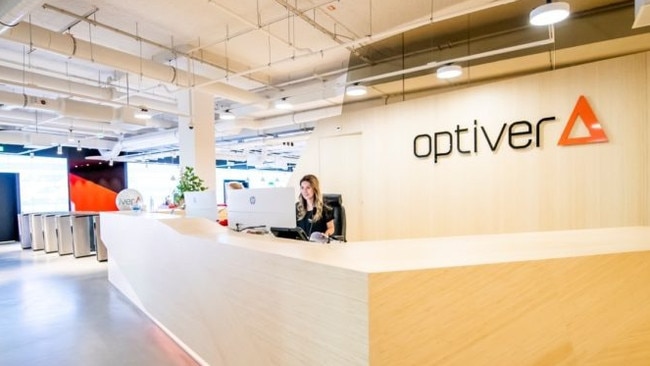Optiver talks to staff following allegations of ‘toxic’ culture
Optiver Australia has ordered middle management to consult with staff in the wake of media reports of alleged bullying and harassment.

Optiver Australia has ordered middle management to consult with staff in the wake of media reports of alleged bullying and harassment, but the firm’s boss has downplayed claims made by former managers against current employees.
Staff at Optiver Australia were told last week to not speak to the media after The Australian reported allegations of a toxic culture made by current and former staff.
In an email signed off by Optiver Australia chief executive Wouter Stinis, the proprietary trading firm said management would be “checking in” with staff to discuss any issues.
But Mr Stinis warns staff to not respond to “any direct questions” if contacted by the media.
“The article references there are current employees that may have concerns with our culture,” he said.
“Over the coming weeks, your team leads will be checking in and we encourage you to be open and honest in your conversations. Please know that my door is always open if you would like to raise concerns with me directly.”
Several current and former staff told this publication Optiver Australia had issues with bullying, with those who were victimised either quitting or leaving the business either through negotiated settlements.
Company sources said they were concerned about speaking publicly about issues at the business, with many fearing they would lose their jobs or that the firm would try to take legal action against them after they signed nondisclosure agreements as part of a settlement.
Mr Stinis disputed allegations aired in The Australian, noting “we don’t believe this article accurately reflects Optiver and our culture”.
“We have a strong track record of positive employee engagement and aim to continuously nurture a healthy workplace environment where everyone can feel respected and comfortable being themselves,” Mr Stinis wrote.
Optiver was “committed to building a healthy positive and inclusive workplace”, he said, pointing to bullying and harassment training and anonymous annual employee engagement surveys, along with the use of “external consultant and industry experts as advisors and to review our policies and procedures”.
“In the unfortunate event that a workplace issue does arise, we have an established Conduct Incident Escalation process,” Mr Stinis noted.
In his email to staff, Mr Stinis also noted concerns over Optiver Australia’s use of nondisclosure agreements.
But he said the firm required staff to sign the agreements to protect intellectual property, not “to restrain them from discussing claims relating to harassment, sexual harassment or bullying”.

Mr Stinis’s email to staff took issue with allegations made by the firm’s former head of human resources, business partnering and operations, Yan Kruger, in The Australian.
Mr Kruger made allegations against two senior members of Optiver Australia, which the firm investigated but made no findings. Optiver noted Mr Kruger had “initiated unprompted communication, with some of our current and former staff, and made various allegations about our cultural practices”.
“Optiver appointed an independent third party to review these and other concerns, with Yan participating in this process, where he was given an opportunity to present his case and concerns,” Mr Stinis said.
“The independent review concluded that the grievances referenced by Yan, were not substantiated by the evidence and it was consequently determined the matters were managed appropriately at the time and no further formal investigation was required.”
In an email seen by The Australian, Mr Kruger alleged a senior member of Optiver Australia, whom The Australian has chosen not to name, harassed a “senior female leader who was a direct report”. Mr Kruger alleged in emails to Optiver Australia, separate to his initial report, that the firm paid the former female member of staff “a large sum of money to keep quiet and not take her allegations further”.
Optiver used forensic advisory firm Curby McLintock via their lawyers King & Wood Mallesons to investigate Mr Kruger’s allegations.
When The Australian questioned Optiver Australia about these allegations, the publication received warnings from King & Wood Mallesons, who claimed there had been “no allegation or complaint” made against the senior staff member and warning that publishing his name would be “factually incorrect and defamatory”.
An Optiver spokesman told The Australian the firm would not discuss “former employees and the terms on which they left the company”.
The Australian is not suggesting the allegations are true, only that they were made by Mr Kruger and investigated.
Mr Kruger said he had hoped “by participating in an investigation, it would lead to Optiver doing more to protect the mental and physical health of its people”.
“Unfortunately, the investigation had all the hallmarks of a sham and whitewash – lacking any semblance of transparency and integrity,” he said.
“None of the ex-Optiverians I provided as witnesses and able to verify the events were contacted.”
Mr Kruger said Optiver’s lawyers refused to detail their findings to him, or explain “what was specifically investigated”.
“They even refused to provide a copy of my recorded interview,” he said. “For Optiver to describe this lack of accountability as though ‘matters were managed appropriately’ is concerning.”
Mr Kruger has previously alleged Optiver Australia had a “track record of silencing those with serious allegations using a combination of coercion, fear and NDAs”.
“That fear stops many coming forth publicly – especially worried it could impact their careers in the insular industry of market making. My concern is nothing will change unless senior management is held to account,” he said.
“I understand Optiver continues to employ a number of known and documented perpetrators – which flies in the face of living their values and duty of care.”







